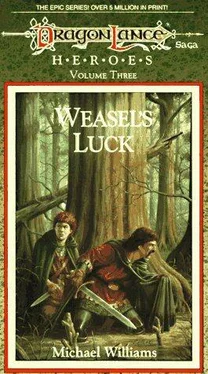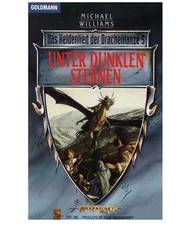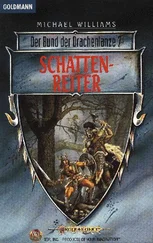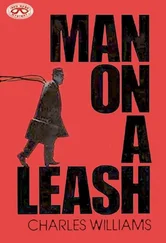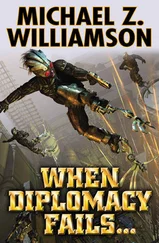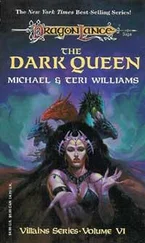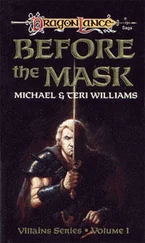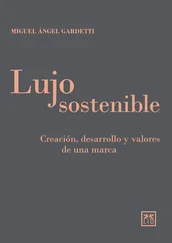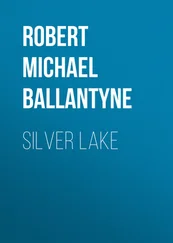Michael Williams - Weasel's Luck
Здесь есть возможность читать онлайн «Michael Williams - Weasel's Luck» весь текст электронной книги совершенно бесплатно (целиком полную версию без сокращений). В некоторых случаях можно слушать аудио, скачать через торрент в формате fb2 и присутствует краткое содержание. Год выпуска: 2005, ISBN: 2005, Жанр: Прочая справочная литература, на английском языке. Описание произведения, (предисловие) а так же отзывы посетителей доступны на портале библиотеки ЛибКат.
- Название:Weasel's Luck
- Автор:
- Жанр:
- Год:2005
- ISBN:0-7869-3181-7
- Рейтинг книги:5 / 5. Голосов: 1
-
Избранное:Добавить в избранное
- Отзывы:
-
Ваша оценка:
- 100
- 1
- 2
- 3
- 4
- 5
Weasel's Luck: краткое содержание, описание и аннотация
Предлагаем к чтению аннотацию, описание, краткое содержание или предисловие (зависит от того, что написал сам автор книги «Weasel's Luck»). Если вы не нашли необходимую информацию о книге — напишите в комментариях, мы постараемся отыскать её.
Weasel's Luck — читать онлайн бесплатно полную книгу (весь текст) целиком
Ниже представлен текст книги, разбитый по страницам. Система сохранения места последней прочитанной страницы, позволяет с удобством читать онлайн бесплатно книгу «Weasel's Luck», без необходимости каждый раз заново искать на чём Вы остановились. Поставьте закладку, и сможете в любой момент перейти на страницу, на которой закончили чтение.
Интервал:
Закладка:
Father and the elf exchanged pleasantries over dinner, and the inevitable pack of dogs crept into the room, drawn by the warmth of the fire and the smell of venison.
Alfric sneered at me from the far end of the table. I flashed him an obscene sign I had learned that morning from a stable boy. He bristled and stared at his wine cup, for this was the first banquet we had attended since he turned thirteen, and for the first time he had been allowed strong drink.
The elf stood to address all of us.
“I have chosen Mantis of the Rose for your evening’s entertainment,” murmured Quivalen Sath. There was probably some bardic grapevine to tell him Father’s favorite poem, for the old man smiled, raised his glass, completely unaware he was getting what Gileandos had dismissed as Quivalen Sath’s “earlier, second-rate efforts.”
After the meal, the entertainment began. Bored at once by some abstract theological tale of free will and roses in the sky, I watched Alfric, who had slumped in his chair as low as his armor would let him, wiping the blade of his dagger upon the back of a snoring dog, whose leg twitched blissfully in imagining he was being petted and scratched. And Brithelm, my middle brother, often mistaken for being absent at public occasions, stood rigid in his garb like some inane red scarecrow, having mastered the art of listening without paying attention. He was probably meditating.
On the other hand, Father was the good host, listening even to the most ridiculous parts of the story. Only Father, finally, offered the elf the respect his celebrity seemed to call for. It occurred to me afterwards, as the bard thanked my father for a dozen pieces of silver, tied his harp over his shoulder, and walked from the hall just as the red moon dipped into the west and the eastern sky began to redden, that if Quivalen Sath was so all-fired successful, why was he playing the backwater villages of Solamnia?
I was supposed to go straight to bed, but instead crept to the battlements, where I had left my toy soldiers when called to supervise the reception for the elf. The battlements were cold, even for an early morning in late summer. My legions were set in a convenient crenel overlooking the drawbridge and the low, swampy woods about a mile off to the west of the moat house. Some of the soldiers stood headless from extravagant use; others, quite intact, leaned against the battlements.
By this time Quivalen Sath had reached the other side of the moat, from where the well-tossed, iron-forged soldier must have stung considerably when it struck him on the back of his well-combed poetic head, and from where a nine-year-old would-be assassin could make himself virtually invisible, hidden among the clematis and ivy and the much more common weeds, undetected by even the sharpest of elvish eyes.
But by some stroke of ill luck, there were other eyes on the scene. Alfric had followed me to the battlements (remember I was only nine at the time, and not yet used to looking back over my shoulder constantly for suspicious brothers). Standing behind me, hidden by shadow and vines and crenelation, he witnessed the bombardment of Quivalen Sath.
The family heir seized me before the elf had rubbed his head, scanned the horizon, and returned to the path that led from our home toward the next way station in his endless poetic wanderings.
“I seen the whole thing, you little snit,” Alfric hissed.
“You mean you saw the whole thing,” I corrected, always delighted to remind my brother how I stood in greater favor with Gileandos than he ever had. It was not a wise thing to have said at the time, for Alfric was on me like a wild boar. My back to big brother, face pressed uncomfortably into the moss-covered stone of the battlement, head entangled with ivy and weeds like a wreath on the brow of a second-rate bard, I corrected my correction.
“Just what was it that you seen, Brother dear?”
“I seen you throw that soldier at the elf,” he replied.
“But what you never seen, Brother, was what that elf was up to. There was something glittering—I saw it—he held up to the light and then slipped into the sleeve of that long bardic robe. Probably our silverware, a crystal goblet from Father’s table.”
“But there wasn’t no crystal or silver at the table. We was entertaining poets, not merchants.” He pushed my face farther into the stonework. I tasted mortar, moss.
“But you didn’t see him mapping—mapping the terrain around the house. No doubt he’s a Nerakan agent or a spy for some anti-Solamnic fanatics who plan to lay siege to Father.”
Alfric’s grip did not slacken, nor did the pressure of granite against my nose diminish. I tried the last tactic.
“Has it occurred to you, Alfric, that you have been made the victim of elvish enchantment? Of hypnotism? That what you have seen only appeared to take place?”
No change in his grip or my posture, for Alfric was balancing upon that edge in which stupidity becomes a kind of insight: he simply did not have the imagination to believe anything beyond what his eyes told him. So I was forced to confess, to blubber and weep and beg, and to throw myself on his mercy, which, unfortunately, he had none of at the time.
But Alfric developed some imagination, to be sure, as the first faint glimmers of blackmail saw light in the months that followed. Hospitality was, as you already know, a big thing with Father, and my misdeed grew in my own imaginings, dangled constantly above my head by my brother’s cruelty and greed. It did not help matters that Quivalen Sath wrote one of his long-winded “epistles” to Father, in which he claimed to have been “granted a visionary moment” when a “godly missive” from the battlements of the moat house had struck him in the back of the head.
Was the object which plummeted from the heavens a gift from Branchala? As Sath never found the toy soldier (believe me, I took care of that by burying the entire army deep in the moat house midden), he took the evidence of a purple bump on his noggin as physical evidence that the artist must suffer to create. Unfortunately, the visionary moments expanded into blackouts over the next several months, from which the elf recovered eventually, writing of his experience in the poem Dark of Solinari, which, though never published, passed through our part of Coastlund by word of mouth. Its reference to “a gray Knight’s morning missive,” though ambiguous, was enough to keep Father guessing whether one of his sons was at the bottom of the mystery, especially when he caught the servants doubled over, reciting the line. No, Father would not forgive my insult to a famous bard. He would probably turn me loose to fend for myself in the swamp south of the moat house, Warden Swamp: from which, we knew, nobody returned. Under Alfric’s threats I took over his chores of cleaning the stables, of cleaning his private chambers. And when a horse or servant showed up lame, it was Galen the youngest, not the responsible Alfric, who confessed and suffered Father’s anger. Indeed, as the months passed into years, I began to wonder if owning up to the whole Sath business would do me some good. Probably not.
This is the way things were, a time in which I found a great delight in resentment, in plotting a revenge so sweet and elaborate that the pieces only began to fall into place eight years from that summer night, two weeks after my seventeenth birthday, on a night I have told you of already.
From where I sat now, revenge had yet to become sweet. For no sooner had the light faded from the corridor, had the dungeon in which Alfric and I were confined resumed its silence, than my brother, as I have said before, began to crawl like a monstrous crab across the dark floor, stumbling and cursing in the dark, muttering, “Where are you now, you little felon?”
Читать дальшеИнтервал:
Закладка:
Похожие книги на «Weasel's Luck»
Представляем Вашему вниманию похожие книги на «Weasel's Luck» списком для выбора. Мы отобрали схожую по названию и смыслу литературу в надежде предоставить читателям больше вариантов отыскать новые, интересные, ещё непрочитанные произведения.
Обсуждение, отзывы о книге «Weasel's Luck» и просто собственные мнения читателей. Оставьте ваши комментарии, напишите, что Вы думаете о произведении, его смысле или главных героях. Укажите что конкретно понравилось, а что нет, и почему Вы так считаете.
